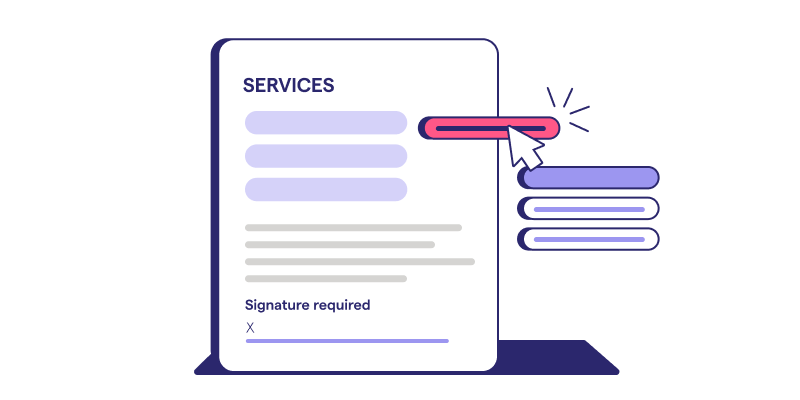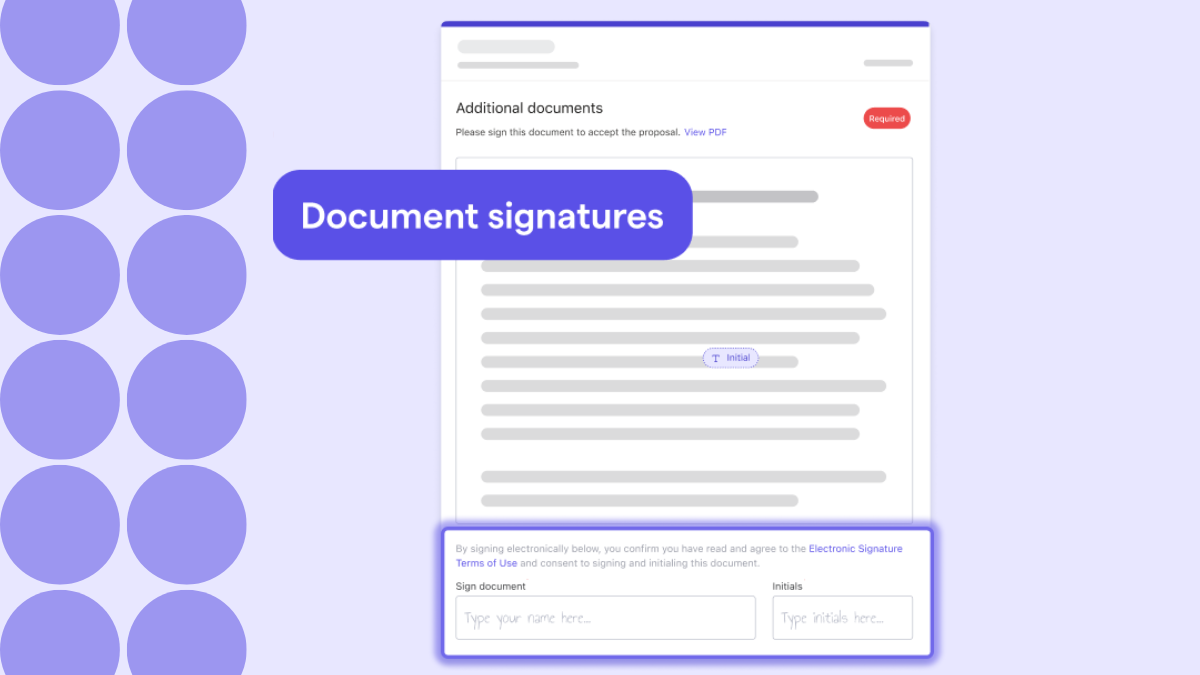8 budget-friendly contract management tools for bookkeepers

Drafting and revising contracts. Making sure they’re legally binding. Tracking signatures. Storing everything in one place. Contract management is essential to your bookkeeping business, but handling it all manually takes time you can’t afford to lose.
For solo bookkeepers and small firms alike, the right contract management tool can save hours of admin each week, reduce errors, and help you deliver a smoother client experience. Better yet, you don’t have to spend a fortune to get those benefits.
Below, we’ve rounded up eight budget-friendly contract management platforms. We’ll break down each tool’s pricing, key features, limitations, and how they stack up so you can confidently compare your options and find the best fit for your bookkeeping business.
Key takeaways
- Prioritize value over bare-bones functionality when comparing contract lifecycle management (CLM) tools for bookkeepers.
- Ignition offers an all-in-one solution that combines contract management with automated billing, invoicing, and client lifecycle support.
- Some features, such as legally binding e-signatures, are essential even when you’re on a budget.
- Consider your biggest pain points, whether you’re a solo bookkeeper or running a firm, to find the best solution for your needs.

How to compare contract management tools
Keeping costs down helps protect your bottom line, but that doesn’t mean you should settle for basic tools with limited features. The right contract management solution should be both valuable and affordable, giving you the functions you need without compromising quality or the client experience.
Start by identifying your biggest pain points. Are you losing time to manual data entry? Struggling to manage multiple workflows? Knowing what slows you down helps you prioritize solutions that directly address those challenges.
Look for key features that keep contract management streamlined and scalable:
- Approval workflows and simple client onboarding to reduce admin time and ensure professionalism
- Customizable contract templates that reflect your specific service terms and scope
- Automated reminders to stay on top of renewals
- Legally binding e-signatures for fast, compliant approvals
- Searchable document storage for quick access during audits or contract updates
Before features, weigh other important considerations like platform security, integration options, ease of use, and time to value. A strong tool should help you save time, improve productivity, and support consistent cash flow while delivering a smoother experience for both your team and your clients.
Considerations for solo bookkeepers
Running your own bookkeeping business as a freelancer? That makes a big difference when shopping for contract management tools. You may not have the same pain points as larger firms, like team collaboration, audit trails, or role-based permissions.
But you’re likely working with a tighter budget, which makes value-for-money and platform simplicity essential. Solo bookkeepers also tend to need more efficiency and automation across the client lifecycle to stay productive.
Ultimately, you need a tool that saves time and reduces repetitive admin so you can focus on higher-value work. A contract management system with pre-built, customizable templates, automated payment collection, and e-signatures is often the best way to minimize manual steps and keep your workflow lean.
1. Ignition
Ignition automates contract management while streamlining client engagement and revenue operations. It simplifies how your bookkeeping business onboards new clients, gets paid, and manages client relationships, all in one platform.
Ignition helps keep your workflow running smoothly and up to date. Key contract management features include:
- Customizable, industry-vetted proposal templates you can tailor to your business needs
- Streamlined pricing, packaging, and add-on options to help boost revenue
- Automated payment collection built into contracts (clients submit payment details during signing)
- Simple e-signatures for clients to speed up the process
- Integrations with tools like QuickBooks Online and Xero to improve cash flow and efficiency
With Ignition, you get more for your money. The platform offers benefits beyond basic contract management. You can automate billing and invoicing to save time, reduce errors, and get paid faster. The Business Insights Dashboard helps identify ways to optimize operations, while instant billing makes it easy to handle out-of-scope work.
Ignition offers affordable pricing plans across four tiers: Solo, Core, Pro, and Enterprise. Each is designed to meet the needs of firms of different sizes and complexity. You can also try the platform free for 14 days.
One note to keep in mind: While Ignition’s sample contract and engagement letter templates are industry-vetted, they should still be reviewed to ensure they align with your specific services, terms, and compliance requirements
Ready to use a contract management tool that works as hard as you do?
Choose your plan.
2. Docusign CLM
Docusign CLM automates the client lifecycle, from drafting contracts to storing and updating them as needed. It helps accelerate the approval process and simplifies contract tracking.
Key features for contract management include:
- Integrations with Salesforce, Microsoft 365, and other document management tools
- Built-in e-signatures for fast and secure contract execution
- Automated workflows for a more seamless review and approval process
- Template and clause libraries to create contracts more efficiently
Customers highlight Docusign CLM’s ease of use and efficient document management. However, some note that it’s costly and offers limited flexibility for contract customization.
Docusign CLM offers three pricing plans: Personal, Standard, and Business Pro, plus advanced plans with more customization at a higher cost.
How does Docusign compare to Ignition? Docusign’s integrations are built for complex workflows and focused mainly on e-signatures. In contrast, Ignition is purpose-built for bookkeepers and professional services, with vetted engagement letter templates, accounting software integrations, and built-in billing tools—features that Docusign CLM doesn’t provide.
3. Jotform
Jotform offers a simple, flexible way to manage bookkeeping contracts using customizable forms and digital signatures. It’s ideal for small businesses or solo bookkeepers looking for a lightweight tool that’s easy to use and quick to set up.
Some of Jotform’s key features include:
- Jotform Tables for organizing and storing documents
- Customizable contract templates with a drag-and-drop design
- Integrations with Google Drive, customer relationship management (CRM) platforms, and other tools to streamline workflows
- Automated email notifications for tracking contract submissions and updates
Users praise Jotform’s simplicity and flexibility. However, some reviews point to limitations in customization and occasional issues with form performance.
Pricing includes four plans: Starter (free), Bronze, Silver, and Gold, with monthly or annual payment options. An Enterprise plan with custom pricing is also available.
While Jotform works well for businesses that rely on form-style contracts, it’s less suited for bookkeepers. It lacks engagement letter templates and billing features, which limits its usefulness for managing the full client lifecycle.
4. ContractWorks
ContractWorks offers a simple, cost-effective contract management solution with an easy-to-use interface and fast setup. It’s suitable for small to mid-sized businesses with moderate contract volumes in industries like real estate, legal, healthcare, and bookkeeping.
Some of ContractWorks’ key features include:
- Customizable reporting and analytics with insights on contract performance
- Secure contract repository with cloud-based, centralized storage for quick access
- One-click digital signing and customizable reminders
- Smart document tagging for key contract dates
ContractWorks is known for its affordability, customer service, and user-friendly interface, making it a practical choice for bookkeepers looking to simplify contract management. That said, some customer reviews point to issues with its e-signature functionality, workflows, and AI limitations.
ContractWorks offers scalable, transparent pricing across Standard, Professional, and Premium plans. All include unlimited users and a free trial. Add-ons like e-signature packs are available for an additional cost.
While ContractWorks provides reliable contract storage and management, it currently lacks built-in billing and invoicing. That means bookkeepers would need a separate tool to manage payments—either manually (which is time-consuming and error-prone) or with a platform that may not integrate smoothly with ContractWorks, creating potential workflow friction.
5. Lexion
Lexion provides AI-powered contract management features that simplify contract approval, storage, and tracking. It’s best suited for companies that need highly efficient workflows and fast insights, particularly mid to large financial firms and other businesses with higher contract volumes.
A few Lexion features that help streamline contract management include:
- AI Contract Assist, which uses a GPT-powered tool within Microsoft Word for faster drafting and improved compliance
- AI-powered contract repository with centralized, searchable storage
- Advanced reporting and alerts for key contract dates, like expirations
- Integrations with Microsoft Teams, Salesforce, and other tools for improved data consistency
Reviewers note the product’s ease of implementation, customer support, and intuitive interface as standout benefits. Some reviews flag shortcomings in access controls and customization flexibility.
Lexion uses custom pricing based on contract volume, number of users, and feature tiers. There are no fixed plans available.
That said, Lexion isn’t built with bookkeepers specifically in mind. While it excels in contract review and tracking, it leaves out critical functions like billing and invoicing. If you rely on Lexion alone, you’ll still need another tool to manage payments, and without guaranteed integrations, that can lead to extra steps, disjointed workflows, and missed efficiencies.
6. Oneflow
For bookkeeping businesses without complex CLM needs, Oneflow is a solid option. It’s designed for small- to mid-sized businesses and growing enterprises in finance and other industries, especially those that benefit from collaborative contract workflows.
Some of Oneflow’s standout features include:
- Real-time collaboration via shared workspaces and live updates
- Automated workflows and notifications for approvals, renewals, and other contract events
- Dynamic contract creation with customizable HTML-based templates
- Multi-method e-signatures and contract sealing for enhanced security
Oneflow’s intuitive design and straightforward setup are enjoyed by customers. However, some reviews mention missing features and limited customization as drawbacks.
Oneflow offers a 14-day trial of its premium features and a Free Forever plan with access to dashboards, PDF contracts, and audit trails. Pricing tiers include Essentials and Business, with fixed monthly fees per user, plus a custom-priced Enterprise plan.
Oneflow can work for businesses that need affordable, form-style contracts. For bookkeepers, Ignition offers greater functionality—such as pre-built engagement letters, billing and payment automation, and accounting integrations—that help you manage more of the client lifecycle in one place.
7. Dropbox Sign
Formerly known as HelloSign, Dropbox Sign offers a simple and cost-effective e-signature solution for managing contracts. It’s a good option for freelancers, solo bookkeepers, and small- to medium-sized bookkeeping businesses that don’t have heavy or complex contract management needs.
A few of Dropbox Sign’s key features include:
- Signer permissions with 2-factor authentication (2FA) options for better security
- No-code integrations with CRMs, cloud storage, HR tools, and other software
- Audit trails that are non-editable for greater transparency and compliance
- Customizable workflows with automatic reminders and advanced signing options
Dropbox Sign earns positive feedback for its signature functionality and customizable templates. However, some mention challenges with editing, higher costs on certain plans, and limited customization as drawbacks.
Dropbox Sign has a free plan available for one user with limits on signature requests per month. Other plans include Essentials and Standard at fixed prices, and Premium with custom pricing. API access costs extra each month.
Dropbox Sign excels at e-signatures, but it doesn’t provide the all-in-one support that bookkeepers get with Ignition, such as contract management, billing, and payment processing in a single platform.
8. Proposify
Proposify’s cloud-based contract management platform includes collaboration tools to help team members work together on proposals, plus custom templates and other features that streamline client agreements from creation to signing. It’s a strong fit for small- to mid-sized bookkeeping businesses and a range of other industries.
Proposify’s top features include:
- Contract content library for quick access and secure storage
- Customizable contract templates with pre-approved clauses and standardized language
- Legally binding e-signatures
- Comprehensive reporting and dashboard insights
Proposify is recognized for its templates, quick setup, and effective proposal management. Some users, however, mention editing difficulties, limited customization, and occasional formatting issues.
Proposify offers three plans: Basic, Team, and Business. The Basic and Team plans include a free trial, while the Business plan offers a demo.
While Proposify works well for proposal creation, it doesn’t include the invoicing, billing, or payment processing features bookkeepers often rely on to manage client engagements from end to end. That means you’d need to patch together multiple tools or handle those steps manually, unless you opt for a more integrated solution like Ignition.


